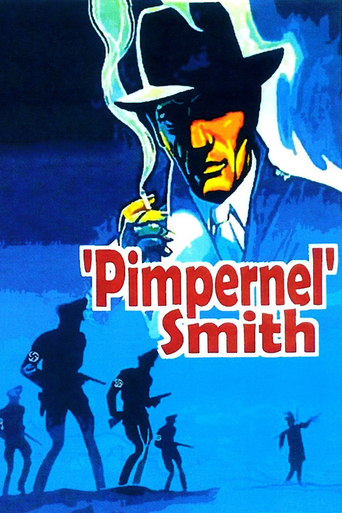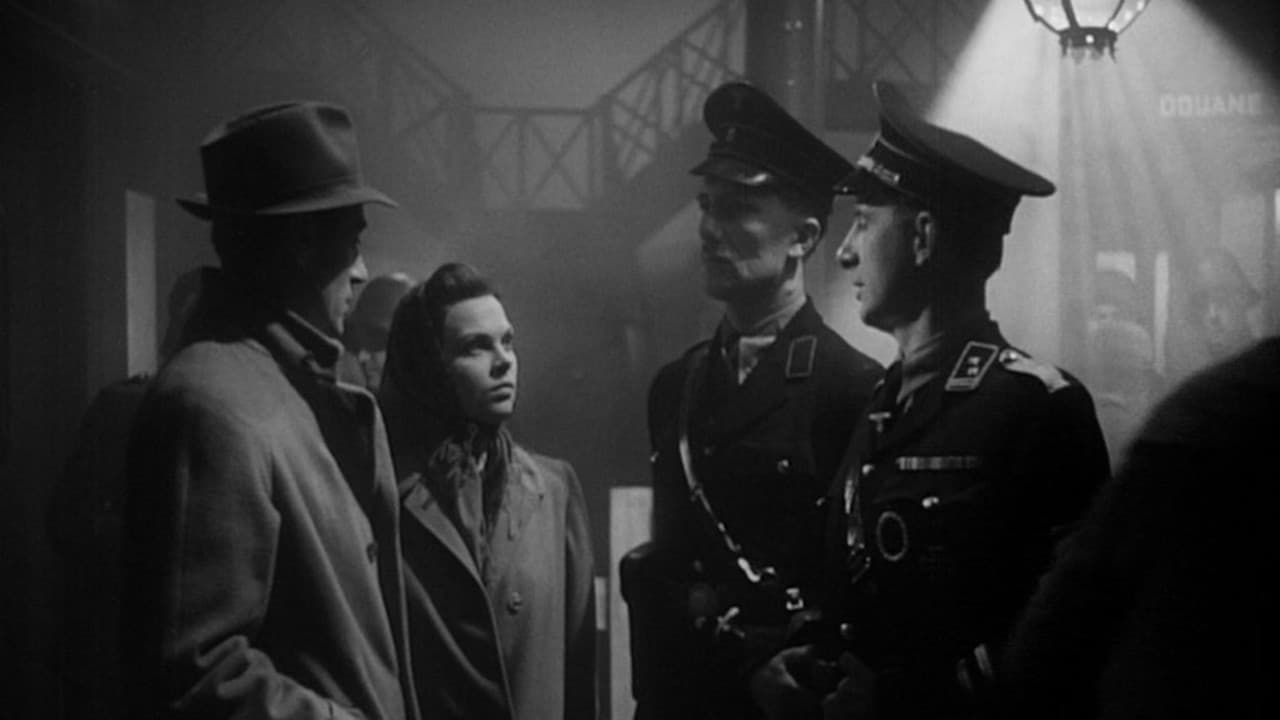Leofwine_draca
'PIMPERNEL' SMITH is a delightful wartime adventure flick starring Leslie Howard as an updated version of the Scarlet Pimpernel. This time around, he's an archaeology professor who goes to Nazi Germany with a handful of students in order to do some studies. Secretly, he's helping enemies of the Nazis to escape from their oppressors. Howard is excellent in the mild-mannered lead role, delivering a surprisingly humorous performance with lots of character work and one liners. The Nazis are obviously depicted as bumbling idiots, which makes for plenty of funny situations, and the narrative works well with a mix of genre elements.
bkoganbing
World War II brought Leslie Howard the opportunity to bring up to modern times one of his most beloved parts, that of The Scarlet Pimpernel. This time he's Horatio 'Pimpernel' Smith, archaeologists by day and rescuer of some of the finest intellectual minds in Germany who are marked for death by Adolph Hitler.In The Scarlet Pimpernel Howard is a Georgian fop as his cover for the dashing, unknown, and elusive pimpernel. Substitute fop for tweedy as he's now an Oxford archeology professor and his cover is a beaut. One of the Nazi Aryan racial vanities was that way back in the day there was an Aryan civilization. Being the archaeologist he is, Howard's cover is that he's in Germany on a dig, looking for evidence of that selfsame civilization. He even brings along several students as part of the cover.In one scene Howard is wounded when he's disguised as a scarecrow and a Nazi guard shoots at it to make a point. That does lead to him being found out by his students, one of them being David Tomlinson, later the father in Mary Poppins. To a man, they all decide to stay and help him with his work.Howard's a bachelor here so he doesn't have wife Merle Oberon and her family dirty laundry to compromise him as he did in The Scarlet Pimpernel. Here he's dealing with Mary Morris who is collaborating with the Nazis to keep her musician father, Peter Gawthorne alive.Taking the place of Howard's relentless foe Chauvelin as played by Raymond Massey is Francis L. Sullivan as General Von Graum of the Gestapo. Sullivan is a favorite character actor of mine and a joy to watch in any film he does whether a good guy or the baddest of bad guys as he is here.Leslie Howard directed this film himself and it's interesting to speculate had he survived World War II whether he would have done more work behind rather than in front of the camera. In directing Pimpernel Smith, he certainly had the advantage of knowing his character well.And you shouldn't pass up an opportunity to get to know him too.
theowinthrop
In 1935 Leslie Howard made one of his finest films in the historic romance, THE SCARLET PIMPERNEL. He played the hero, Sir Percy Blakeney, who was a society leader but also a society twit, who spent time staring through an eyeglass criticizing the way a man's cravat was tied, or a sleeve was cut, or how Romney was painting his wife. But when alone with his intimates he was "The Scarlet Pimpernel" who planned the rescue of French aristocrats from the guillotine. He and his gang are fighting a war to the death against Citizen Chauvin (Raymond Massey), the Jacobin agent/minister to Britain, who is seeking to end the rescues. In between is his beloved, but seemingly tarnished wife (Merle Oberon) who is trying to save her captured brother, and unknowingly reveals her husband's secret to Chauvin. The conclusion of this adventure film was very exciting and surprising. But there was and is a problem with THE SCARLET PIMPERNEL. Despite Baroness Orczy's marvelous writing ability (try her detective tales of THE OLD MAN IN THE CORNER as a good follow-up), she was deeply impressed with the old order of aristocracy. Only once, in the film, did a sense of balance come through - and oddly enough out of the mouth of the villain. Merle Oberon had testified for the French Revolutionary Court against some aristocrats, dooming them (by her testimony) to death. She has never forgiven herself (and it has blackened her reputation). In bemoaning this Massey gets disgusted and spits out, "Why is it that everyone is always condemning what happened to the poor aristocrats and never think of what they did to us?!" It's a good point, but because we dislike Massey and his boss (Robespierre, of course) we never stop to consider it for long. Howard was able to repeat and improve on the original film in 1942 with PIMPERNEL SMITH, where as Professor Horatio Smith he uses his archaeological digs in Germany (for proof of an Aryan civilization before Greece or Rome) to rescue intellectuals and victims of the Nazi Reich. Here his opponent is General Von Graum (Francis L. Sullivan) who is like Chauvin in his sharpness and pomposity. He is an obvious knock at Hermann Goering (who was obese like Sullivan) and has Goering's sham bonhomie and his total vicious streak. The writer of the screenplay must have had some discussion with German refugees in the know (notice the bits about Von Graum throwing a tantrum and then turning about and offering German chocolate to someone who has come through for him). The film also uses Howard to brilliant advantage in one sequence, disguised as a bureaucrat, who he himself states was the most disagreeable person he ever thought up. The ultimately efficient German bureaucrat is totally inhuman - a talking machine of bossy efficiency. Percy Blakeney was disguised several times, as an old crone and a soldier, but never someone so disagreeable.And that is the difference. THE SCARLET PIMPERNEL deals with the 1790s and the Reign of Terror. It was a century and a half in the past, and really could not annoy the French too much (though one wonders what it's box office was like in France). Britain and Germany were at war in 1942, and the film couldn't present even one moment where Von Graum could make a comment like Chauvin's outburst. As a matter of historic record, Chauvin had some point about the sins of the Ancien Regime as opposed to the Revolutionaries. Knowing what we know now about Von Graum's buddies, he would not have been able to say much.The closing of the movie was a memorable speech by Howard, about how Germany's entrance into war was not the start of it's road to glory but to it's destruction. True enough in 1945 - 1950 or so. And when he manages to take advantage of Von Graum's brief distraction to vanish into the night, the Nazi fires his gun into the empty space. "I'll be back," we hear Howard repeat twice. It is haunting, because of his real fate of being shot down in the war by a Nazi plane. Howard physically did not return, but spiritually he did with the men at D-Day all the way to V.E.Day.
Howard Schumann
Returning to England before the war, Leslie Howard was a towering figure in the British government's anti-Nazi propaganda policy, making patriotic radio broadcasts and movies that lifted the spirits of the British people in the dark days of the war. One such film was Pimpernel Smith in which Howard plays Archeology Professor Horatio Smith who doubles as a British spy, undertaking to help refugees escape from the Gestapo. Based on the novel The Scarlet Pimpernel by Baroness Emmuska Orczy and modeled after the 1934 film of the same name, Pimpernel Smith is said to have influenced Raoul Wallenberg, known for his heroism in rescuing Hungarian Jews from the Holocaust. In the film, Professor Smith takes six students with him on an archaeological dig in Germany, presumably to find out whether or not there was an early Aryan civilization in Germany. Smith tries to convince Gestapo leader General Von Graum (Francis L. Sullivan) that he is just a learned professor, reading from The Jabberwocky by Lewis Carroll and telling him his theory that William Shakespeare was really the Earl of Oxford. Imagine that! The Professor's wit and wisdom are no match for the humorless Nazis and they seem to fall for each of the professor's tricks. Unfortunately, the Nazis are depicted not as mass murderers but only as bumbling clowns who speak English as well as Winston Churchill. When Smith is wounded, the students catch on to what he is up to and agree to help him in his attempts to secure the release of pianist Sidimir Koslowski (Peter Gawthorne). In his clandestine cat and mouse game, he meets Koslowski's daughter Ludmilla (Mary Morris) who is working for the Nazis in order to save her father and the two form a bond. Howard's role as Professor Smith is one of his most acclaimed in a career that included roles as Ashley Wilkes in Gone With the Wind and Sir Percy Blakeney in The Scarlet Pimpernel. He had a great sense of style and screen presence and his death in 1943 on what was most likely an intelligence gathering mission for the British left the film industry bereft of one of its brightest stars.



 AD
AD


